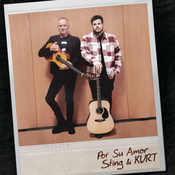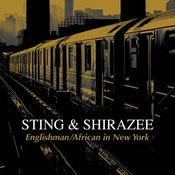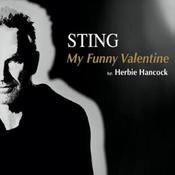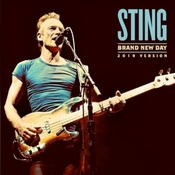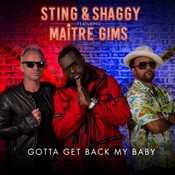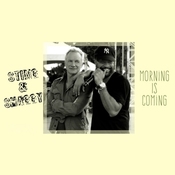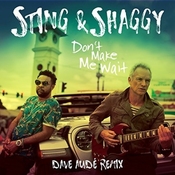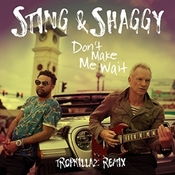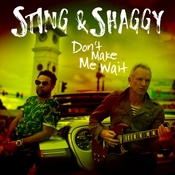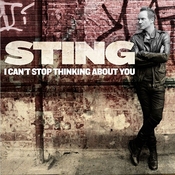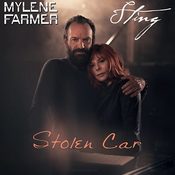Fields Of Gold, 7''
Soundbites
Sumner's Tales: Sting talks...
"Well I've moved to the country for the first time in my life, and there are barley fields right next door. And I remember walking through one day and seeing this crop being moved by the wind and the sunshine, and it looked like there could have been people making love in the barley, or the wind seemed like it was making love to the barley, so I thought it was a great metaphor for love, and, its a kind of love song."
'Ten Summoner's Tales' Promotional Interview Disc, '93
"But now the audience has taken to doing this when I sing it (he sways like barley in the breeze), en masse, which is disconcerting. But you can't stop them, can you Oi! Stop that fucking shite!"
Mojo, 2/95
"They wanted to do a version of the song so they wrote to me asking if I wanted to sing. I agreed, of course. Their version was an enormous success in France, Corsican music, by the way, is very popular in France. It was fun meeting them and I liked their interpretation."
On I Muvrini's version of the song... Pà?blico, 10/99
"It wasn't huge in the charts but I like it. It was written and recorded at Lake House, and recorded here, and it's just a song about the landscape. I love the place. It takes a lot to get me away. It was the record company's idea to call the album 'Fields of Gold<'i>. I argued against it at first, but I suppose it fits. Maybe it should have been 'Fields of Platinum'."
Independent On Sunday, 11/94
"Some of my most successful songs have been very simple; I reminded myself of that. One of the most successful was 'Fields of Gold<'i>, which is as straight a folk ballad as you'll find."
The Long Beach Press-Telegram, 11/94
"The melody for 'Black Seam' has lain among my mental notes for perhaps ten years, could never finish it, or find a suitable lyric until the miners' strike and a long talk with a friend who has a job trying to mend nuclear power stations with gaffer tape."
'Bring On The Night' Album Liner Notes, '86
"I've just been reading a book by Schumaker called 'Small Is Beautiful', subtitled 'Economics As If People Mattered'. And he's saying there's more to economics than making a profit. The social cost of disintegrating those societies is immense. Kids brought up in that environment now think about the police in a totally different way, and justifiably so. It's become Northern Ireland over again. If that's progress, we've got to get that woman out of power. Also I felt that during the miners' strike the case for coal was never put to the nation. Kinnock didn't explain it, Arthur Scargill didn't even address it, it was complete personality rhetoric with Thatcher. And the case for coal is really strong. I have a couple of friends who work in the nuclear power industry, who telephone me occasionally with horror stories about how dangerous and inept the whole system is. It's an industry which exists in the shadows, it's bound up with security and high walls and barbed wire."
NME, 6/85
"I'm from Wallsend which had two industries: Swan Hunters shipyard, which I was born right next to, and on the other side of town was the Rising Sun pit. So if you didn't go to grammar school, which I did, there were two choices open to you for work in the town, the shipyard or the pit. And now they're closed. I taught in a mining village in Northumberland, all the children's fathers were miners. The area I was brought up in was literally built on coal. There are 300 years of coal supplies left, and they're closing all these pits. And five miles from where I lived they're now building a nuclear power station, where they have to import uranium from South Africa. And I frankly think the government has got its head up its arse. They're destroying communities that are culturally very rich. And the government's offering them no alternative, saying you're completely useless."
NME, 6/85
"Those machines were turned on 20 years ago and they don't know how to turn them off. Now they're falling to bits and they don't know how to repair them. It's frightening. There are too many stories of kids with leukaemia around power stations for it to be just rumour, just superstition. The good thing is that people are catching on. I was actually pro nuclear power at one time. I thought, well, it's clean, it's efficient. Until you actually start investigating it, it just takes a little bit of nous to realise we're having the wool pulled over our eyes. 'We Work The Black Seam' is about the dignity and heroism of being a coal miner. I think symbolically the miner in our society plays an important part, subconsciously. If you think about it in a symbolic way, the miner digs into the backbone of the country, and brings out power. There's something very noble in the image."
NME, 6/85
Backgrounder
'Fields Of Gold' originally appeared on 1993's 'Ten Summoner's Tales' album, and was the third track from the album to be released as a single. Whilst the single only reached #16 in the UK and #23 in the States, it has become one of the most popular Sting songs on the radio receiving a BMI award in 1999 for achieving over 2 million airplays on US radio. Undoubtedly a 'classic' Sting song - the track has been an ever present in Sting's set since 1993, featuring Dominic Miller's nylon stringed guitar. The B-side on the 7" and cassette contained the album version of 'We Work The Black Seam' from 1985's 'The Dream Of The Blue Turtles' whereas as the CD singles opted for live version of songs recorded on the Soul Cages tour in Holland during May 1991. One of the tracks was a cover version of Jimi Hendrix's 'Purple Haze'.



